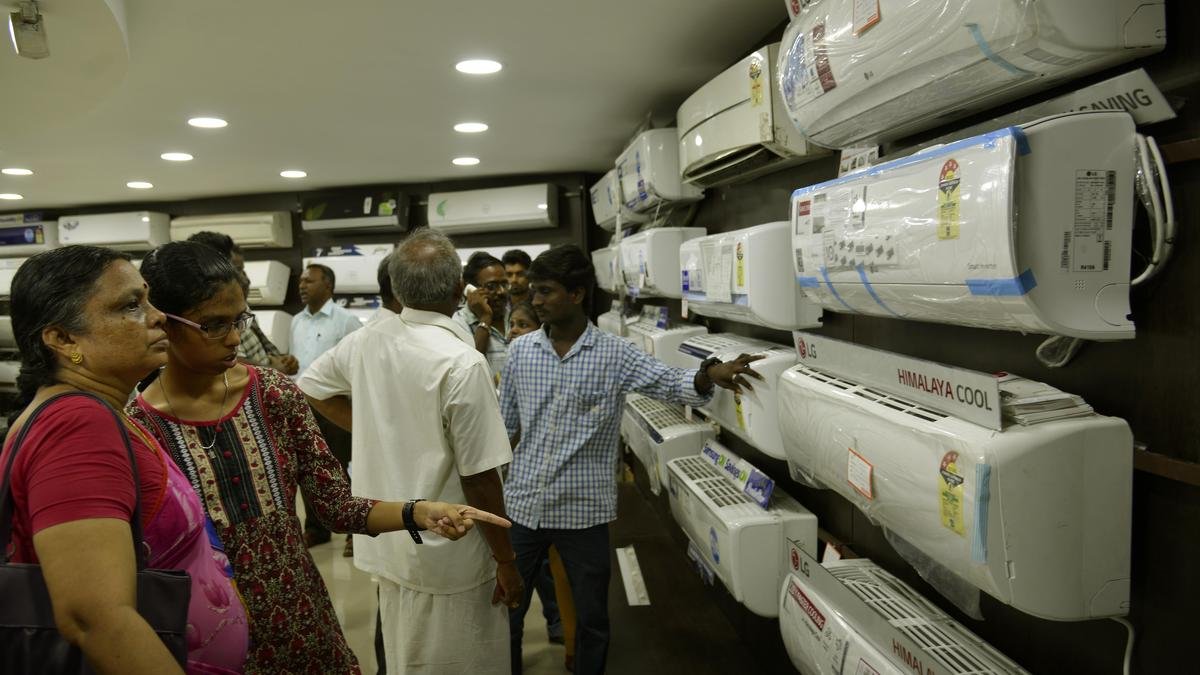Consumer durable firms, auto dealers plan festive offers as buyers wait for GST clarity


For durables, the price impact could be substantial such as bringing down AC units by ₹1,500–₹2,500
| Photo Credit:
MOORTHY M
Consumer durable firms and automobile dealers are preparing for a surge in demand once the government announces a reduction in goods and services tax (GST) rates.
“With the possibility of revised taxes ahead, consumers may postpone their purchases, waiting for the new rates to take effect. As the festive season nears and brands roll out attractive offers, an early announcement of these reforms would help trigger demand at the right time and deliver maximum impact,” said Arjun Bajaj, Director – Videotex.
Auto retailers are also anticipating a shift in consumer behaviour. “We have not yet seen an impact on the purchase hold back but there is a possibility. We had earlier applied to the government to lower GST rates which would make vehicles affordable for all. However, we are yet to determine the timing and discussing with all stakeholders,” said C S Vigneshwar, President, Federation of Automobile Dealers Association (FADA).
“This whole correction of GST is absolutely required. This is good for the medium and long term. But, in the short term, we need to figure out during the current situation, how to mitigate it,” he added. According to FADA, as of July 31, the inventory level of passenger vehicles continues to be around 55 days.
Analysts caution that the move could affect the relative attractiveness of electric vehicles. “One of the drivers of EV demand has been the large tax arbitrage between ICE and EV vehicles. GST rate reduction could reduce tax arbitrage, making the case for EVs less favourable. If the sub-4-metre segment PVs and less than 125cc two-wheelers are moved to an 18 per cent GST slab from 28 per cent currently, the tax arbitrage would be reduced by 10ppt,” said Kumar Rakesh, Analyst – IT & Auto, BNP Paribas India.
For durables, the price impact could be substantial. “The consumer durables industry had anticipated a differentiated GST structure, with energy-efficient products at 12 per cent and others at 18 per cent. A potential rationalisation from 28 per cent to 18 per cent for categories such as air-conditioners (ACs) and other home appliances would translate into a direct market price reduction of nearly 6–7 per cent since GST is levied on the base price. This shift could bring down consumer costs by ₹1,500–₹2,500 per AC unit, depending on the model—an outcome that is not only significant for affordability but also for driving penetration and accelerating industry growth,” said Manish Sharma, Chairman, Panasonic Life Solutions India & SA.
According to Blue Star Managing Director B Thiagarajan, the proposal to cut the GST is expected to create a consumption boost and trigger recovery across sectors including ACs. However, “as we await the formal notification, it is being anticipated that dealers will delay stocking up on products while consumers will postpone their purchases, so it is important that we get more clarity on the same faster.”
Stimulate overall demand
Retailers are already planning responses. “The proposed GST cut is a welcome move for customers and retailers but the time lag in implementation does complicate matters. If consumers defer purchases, it will cause a bit of pain to the industry as we are already sitting on 2–3 months of paid-for inventory. We have started talking to brands and urging them to come out with attractive payment deals now in the run up to Diwali instead of waiting for the festival. We are also sensitising our staff to highlight these EMI-related schemes to customers,” said B K Shankar, CEO, Viveks.
To sustain momentum, firms are lining up price protection schemes and financing promotions. “If the GST rationalisation is announced close to the season, consumers might be reluctant to wait for prices to be confirmed. However, brands are fully aware of this consumer psychology. To sustain buying momentum, companies will employ price protection schemes, enticing offers, and financing promotions,” said Pawan Kumar, CEO of Elista.
Tax experts point to transitional challenges. Pratik Jain, Partner, Price Waterhouse & Co LLP, said industry players would need to examine pricing changes, inverted duty structures, transitional stock impact, possible profiteering concerns, and the effect on fiscal incentives like SGST reimbursements. “Any revision in GST rates can influence consumer demand patterns. A reduction in GST is expected to improve product affordability, potentially stimulating overall demand in the long term. In the short term, one can expect the businesses to offer additional discount to customers so that purchase decisions are not postponed. However, this cannot be completely ruled out,” he noted.
In the auto sector, optimism remains high. “In the long run the GST reforms is of course good. I think this would be a great stimulus for the economy and it would be a welcome reform from the industry as a whole. I see it only as being very positive,” said Dheeraj Hinduja, Chairman, Ashok Leyland.
Published on August 18, 2025



